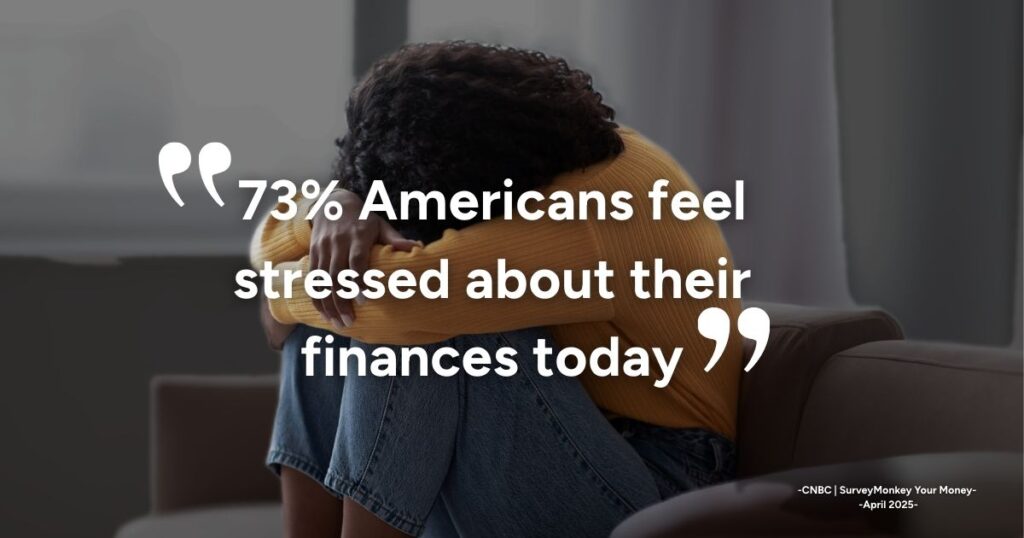Credit card debt doesn’t just live in your wallet but also in your body and mind. It can keep you up at night, make you feel hopeless, and slowly chip away at your well-being. While many people think of debt as just a financial problem, the reality is that debt can take a serious physical and emotional toll.
A study by Princeton economists highlights the devastating effects of economic insecurity in the U.S., connecting it to rising “deaths of despair” from suicide, drug overdoses, and alcohol-related diseases. While their work focused on wide-ranging economic forces, the link between household debt, especially high-interest credit card debt, and emotional distress is clear.
At American Consumer Credit Counseling (ACCC), we see the human side of this struggle every day. Clients come to us not just for lower payments, but for peace of mind, emotional relief, and the tools to regain control of their lives. Credit counseling provides immediate support but more importantly, it addresses the behavior that may have led to debt. Why exactly does debt impact on physical o& emotional health? Let’s explore this in detail.
Debt Impact on Physical and Emotional Health
Chronic Stress and Mental Health
Carrying credit card debt month after month creates a cycle of constant worry. Will I have enough to cover the payment? What if I fall behind? What if I can’t ever get out of debt? This stress becomes chronic, and that’s when it starts to damage mental health.
Research has shown that people with high levels of unsecured debt are more likely to experience anxiety, depression, and even suicidal thoughts. Debt-related shame often keeps people from confiding in others, increasing feelings of isolation and hopelessness. More often than not, clients tell us they’ve felt like they’re drowning before they reach out.
Money worries can weigh heavily on your mind, leading to:
- Anxiety and panic attacks – Persistent worry about finances can trigger racing thoughts and even physical symptoms like shortness of breath or a pounding heart.
- Depression – Feeling stuck or hopeless about your financial situation can lead to a low mood, a lack of motivation, or even despair.
- Irritability and mood swings – Financial tension can make it harder to regulate emotions, leading to outbursts or increased conflict with others.
- Sleep disturbances—It’s hard to rest when your mind is racing through unpaid bills and mounting credit debt.
- Feelings of shame or guilt – Many people internalize their financial struggles, leading to low self-esteem or embarrassment.
- Social withdrawal – Some people begin isolating themselves to avoid uncomfortable conversations or spending money.
- Difficulty concentrating – When constantly stressed about money, it can be hard to focus at work or in daily life.
Physical Health Consequences
Emotional stress doesn’t just stay in the mind; it shows up in the body. Chronic stress from debt can lead to high blood pressure, headaches, gastrointestinal problems, and even an increased risk of heart disease. Sleep becomes difficult when every quiet moment is filled with worry.
For many, the physical impact goes unnoticed until something breaks down mentally or physically. It’s easy to underestimate how much energy goes into just surviving financially.
Stress doesn’t stay in your head; it affects your body too. Common physical symptoms include:
- Headaches and migraines – Stress often causes tension in the neck and shoulders, leading to frequent headaches.
- High blood pressure – Chronic stress can elevate blood pressure and strain the heart.
- Digestive problems – From upset stomachs to more serious issues like ulcers or irritable bowel syndrome (IBS), stress can wreak havoc on your gut.
- Muscle pain or tightness – Your body tenses in response to stress, which can lead to chronic pain or fatigue.
- Weakened immune system – Prolonged stress can make you more susceptible to illness.
- Fatigue – Constant worry drains your mental and physical energy.
- Increased risk of heart disease – Over time, unmanaged stress can contribute to heart issues, including heart attacks and strokes.
Strain on Relationships and Self-Worth
Debt can be a deeply isolating experience. It strains relationships, especially in households where money is already tight. Arguments about spending, secrecy around credit cards, and feelings of guilt or blame can erode even the strongest partnerships.
Beyond that, people struggling with debt often carry heavy feelings of personal failure. But the truth is, many factors like medical emergencies, job loss, inflation, or caring for a loved one can trigger financial crises. Debt isn’t a moral failing. It’s a challenge that can be faced and overcome with the right support.
Economic Insecurity and the Bigger Picture
The emotional and physical effects of debt aren’t just individual struggles, they are part of a larger crisis of economic insecurity in the U.S.
In the 2019, study (Case and Deaton) a direct line between declining economic stability and what they called “deaths of despair” was identified. These deaths caused by suicide, drug overdoses, and alcohol-related diseases have been rising among working-age Americans, especially those without a college degree. The root causes? Stagnant wages, job loss, a weakening social safety net, and the crushing burden of household debt.
While the study didn’t single out credit card debt specifically, it clearly contributes to the problem. For many Americans, credit becomes a temporary lifeline during financial emergencies. But when high interest rates and fees stack up, that lifeline turns into a trap pulling people deeper into despair.
Debt adds to a sense of hopelessness. It makes the future feel out of reach. When people don’t see a way out, their mental and physical health suffers, and in the worst cases, so does their will to keep fighting. This is why the work we do at ACCC matters. It’s not just about money, it’s about mental health, family stability, and saving lives.
How ACCC Helps Improve Physical and Emotional Health
The Moment People Reach Out
Many of our clients say the hardest part was picking up the phone. There’s a lot of shame around debt, especially when people have been trying to manage it on their own for years. But when someone reaches out to ACCC, they’re met with understanding, not judgment.
That first conversation can be a turning point. For the first time in a long time, clients hear the words, “You’re not alone, and there is a way forward.”
Immediate Stress Relief
One of the biggest emotional benefits of credit counseling is how quickly the pressure starts to ease.
When clients enroll in a debt management program, they often see their interest rates reduced, and their monthly payments drop to something manageable. Instead of juggling multiple payments, they make just one monthly payment, which is then distributed to their creditors. That alone lifts a huge weight. With a plan in place, clients can start sleeping better, focusing on work, and feeling hopeful again.
What is the Cause of Credit Card Debt
However, ACCC doesn’t stop with payment relief. Our certified credit counselors work with each client to look at how the debt happened, evaluate all the options, and more importantly how to prevent it from happening again.
We help people develop the skills and habits that build long-term stability through budgeting, financial education, and one-on-one counseling. Whether the debt was caused by medical bills, a divorce, loss of income, or overspending, we help clients regain control.
Clients often tell us they feel empowered after counseling. They go from overwhelmed to organized, from anxious to in control. And that shift doesn’t just change their finances, it changes their lives.
Healing More Than Just the Balance Sheet
At ACCC, we believe financial recovery is about restoring peace of mind, regaining confidence, and building a path forward. A structured debt management program and credit counseling offer more than a payment plan. It offers hope. No matter how overwhelmed you feel right now, you are not alone. And you are not out of options.
Debt Management Plans Can Improve Your Health
If credit card debt is taking a toll on your physical and emotional health, learning more about your options is best. We have been providing debt relief since 1991, and we understand that it combines many factors that cause people to get into debt. It could happen to anyone. We’ll help you reduce your monthly payments, relieve stress, and create a plan that works for you. Because you deserve more than survival, you deserve stability, support, and a second chance.
If you’re struggling to pay off debt, ACCC can help. Schedule a free credit counseling session with us today.
Sources:
Case, A., & Deaton, A. (2019). Deaths of despair and the future of capitalism. Princeton University Press.
Turunen, E., & Hiilamo, H. (2014). Health effects of indebtedness: a systematic review. BMC Public Health, 14, 489.






